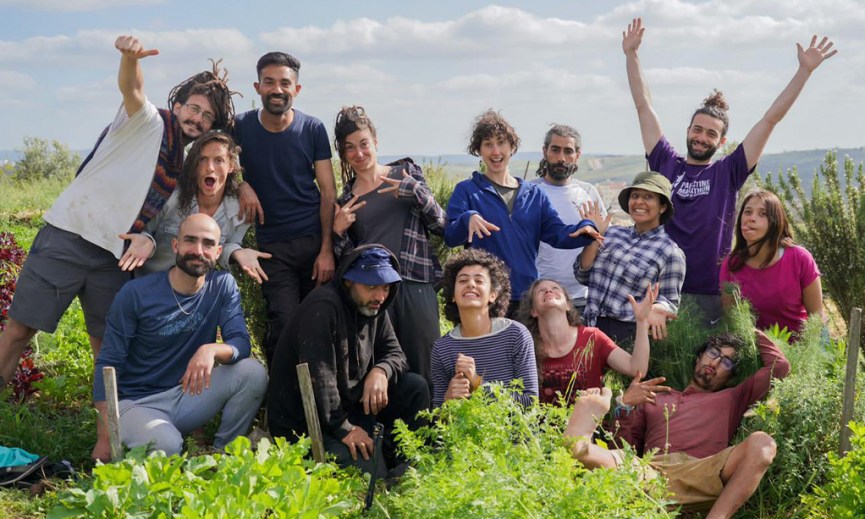Surrounded by a 26-foot-high separation wall, barbed wire, and a watchtower, a group of young Palestinians prepares a 3.5-acre piece of land for the growing season in spring. The noise
Economy
Rooting for Black Land Ownership
Exploring the history of land theft in the U.S., Brea Baker argues that the Black reparations and Indigenous Landback movements are stronger together.
Cultivating Dragon Fruit’s Political Power in Ecuador
Amid ongoing colonization, the Indigenous Shuar people are taking back control of their economic and political futures.
Meet the Mercaditas Fighting for Fairness in Mexico
Street selling is a risky activity in Mexico City. But the mercaditas movement aims to empower women and nonbinary sellers to protect themselves from economic exploitation.
Protecting Workers in a Warming Climate
At a time of extreme heat, a new proposed OSHA rule could protect millions of American workers from heat-related stresses and even fatalities.
Green Cities Are for People, Not Profit
Across the country, activists are battling gentrification and working to build sustainable cities that don’t displace working-class communities of color.
Are the Olympics Still Relevant?
In the face of catastrophic climate change and the genocide in Gaza, can the world afford to hold a spectacle such as the Olympics?
Land as Reparations
Author and activist Brea Baker explores why Black land ownership is a critical aspect of reparations for Black Americans.
Can Elections Still Help Defund Police?
Efforts to invest in “care, not cops” continue in advance of the 2024 election—albeit at a slower pace than in 2020.
Access to Past Tribal Constitutions Can Help Tribes Shape Their Futures
A new database of tribal constitutions tells a more nuanced history of self-governance than the one explained in textbooks.
Reject Ego-nomics, Embrace Eco-nomics
Finding our way to a viable human future will require the guidance of a true eco-nomics, grounded in biology and ecology rather than finance and capital.
What $500 a Month Freed Up for Families
Participants in a Massachusetts guaranteed income pilot said the program provided them a financial cushion and increased time and bandwidth for parenting.
Can the DOJ Break Up Live Nation’s Monopoly?
A new DOJ lawsuit is challenging Live Nation and Ticketmaster’s monopoly power over artist performances, venues, and concert-goers.
Making Childcare Sustainable for Parents and Providers
To highlight the unsustainable costs of child care for parents and providers, Community Change Action marked "Day Without Child Care" for the third year in a row.
Breaking Up With Capitalism
A paradigm shift for our economy begins when we name and see the anti-democratic bias that lies at the heart of our capital-centric system.
Bringing France’s Waste Prevention Plan to Life
Regional waste-reduction programs hold lessons for communities across the globe.
Union-Busting Is Rampant. Here’s How to Fight Back.
A two-step card check process is efficient, making it easier for workers to unionize with a simple majority.
UAW Makes History at Tennessee Volkswagen Plant
The United Auto Workers’ union victory in Tennessee was the result of strategic decisions, and could herald a bright future for organized labor in the South.
EVs Could Meet Biden Climate Goals—Just Not Chinese Ones
Why can’t Americans buy Chinese electric vehicles that could help the Biden administration meet its climate goals?
Tax Day Injustice
Thanks to the GOP’s 2017 tax reform law, dozens of large corporations paid their CEOs more than they paid the federal government in taxes.
The Coffee Shops Countering Recidivism
A criminal record keeps many qualified candidates out of work; these coffee companies are helping clear the first hurdle.
New York Considers a Social Housing Bill
Social housing as a concept is gaining popularity. Now, the state of New York is considering a bill to make it a reality.
Lessons in Pandemic Spending
Author Scott Fulford explores the impact that pandemic-related government social spending had on American families.
Soil As a Source of Prosperity
Rethinking our connection to the soil can form the basis for new ways of thinking about prosperity and economy
Keeping Brazil’s Black History in Its Tech “Future”
Rio de Janeiro’s Port Zone was once the largest slave port in the Americas. As developers work to “revitalize” the area, Black activists are fighting to retain the remnants of the district’s historical significance.
Help Fund Powerful Stories to Light the Way Forward
Donate to YES! today.

























